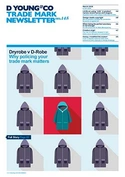Nivea - recognise the blue?
After more than a decade, Beiersdorf’s abstract colour mark for NIVEA BLUE remains registered. The trade mark dispute, which has kept inter alia the German Federal Patent Court (Bundespatentgericht – BPatG) and the German Federal Supreme Court (Bundesgerichtshof – BGH) busy for over ten years has finally come to an end. Rather unspectacularly Unilever at last withdrew its cancellation request and the NIVEA BLUE is still on the register.
Office proceedings
On 30 November 2005 Beiersdorf applied for the abstract colour mark DE 305 71 072 “Blue” (Pantone 280C).
The NIVEA BLUE mark was registered on 12 November 2007 for “preparations for body and beauty care, namely skin and body care products”. In January 2009 Unilever filed for cancellation based on absolute grounds. According to Unilever, the mark did not meet the requirements of acquired distinctiveness and, thus, lacked distinctiveness.
The German Patent and Trade Mark Office (Deutsches Patent- und Markenamt - DPMA) agreed with Unilever and the NIVEA BLUE mark was cancelled.
The first BPatG decision
On appeal, the BPatG confirmed the DPMA’s decision in March 2013 (docket no. BPatG 24 W (pat) 75/10). According to the BPatG, the NIVEA BLUE mark would not amount to more than a decorative background and, accordingly, would not be perceived as a trade mark.
Furthermore, the BPatG held that to establish acquired distinctiveness the owner would need to show a degree of recognition of more than 75% with the relevant public, meaning that the relevant public would need to assign the colour to a specific undertaking. As the consumer survey submitted by Beiersdorf did not confirm such recognition, Beiersdorf could not rely on acquired distinctiveness.
The BGH decision
Of course, Beiersdorf did not leave it at that, but filed a further appeal with the BGH (docket no. I ZB 65/13).
More than 50% recognition is sufficient to show acquired distinctiveness.
In its decision, the BGH clarified that in order to demonstrate acquired distinctiveness, a degree of recognition of “only” more than 50% would suffice. In turn, the threshold of more than 75% established by the BPatG would be too high.
Aside from that, the consumer survey submitted by Beiersdorf would have been methodologically incorrect as the colour shown to the surveyed included a white border.
Consequently, the BGH remitted the case to the BPatG.
The second BPatG decision
Based on the BGH’s findings, the BPatG instructed a new consumer survey with GfK SE to assess the degree of recognition of the NIVEA BLUE mark for “preparations for body and beauty care, namely skin and body care products”. The consumer survey showed a degree of recognition of over 50% for deodorants, hair care products, body cleansing products, namely shower and bath products, soaps, means for shaving, namely shaving foam, shaving gel, aftershave, skin care products, and facial care products. Based on a press release from Beiersdorf the degree of recognition for skin care even exceeded 71% (see https://dycip.com/beiersdorf-news). Unilever did not object to these findings and withdrew its cancellation request.
Naturally, Beiersdorf had an interest in adjudication and argued that the withdrawal would require Beiersdorf’s consent. In addition, Beiersdorf requested that the BPatG rule on the matter by way of declaratory judgement.
There is no justified interest in declaring that a cancellation action was filed without good reason.
The BPatG held that there was no need for Beiersdorf’s consent and that Beiersdorf had no justified interest in declaratory judgement. Since the previous decisions were rendered ineffective due to the withdrawal, there was no further need for adjudication.
In short
Acquired distinctiveness of abstract colour marks in Germany requires a degree of recognition of more than 50%. To show such recognition a consumer survey will be the decisive factor.
Following the withdrawal of a cancellation request there is no justified interest for declaratory judgement.
Case details at a glance
Jurisdiction: Germany
Decision level: Bundespatentgericht
Parties: Unilever (revocation applicant) and Beiersdorf (trade mark owner)
Date: 18 October 2019
Docket number: 27 W (pat) 1/17

